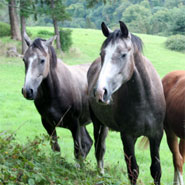Posted: 24 June 2008
Exploring horse welfare in Ireland
Conditions for horses at unregulated gatherings, including fairs and races, and the treatment of horses towards the end of their productive life, may pose the highest risks to horse welfare in Ireland, according to a new study.
The findings are part of the mid-term results from a review of horse welfare in Ireland from 2007-2009 that were presented at a seminar in University College Dublin last week. The review by researchers at University College Dublin explores horse welfare in Ireland in light of recent and proposed legislative changes.
“The imposition of regulations was considered by respondents as the most likely effective method of improving horse welfare, followed by information and education campaigns and fiscal measures,” says Joe Collins, from the UCD School of Agriculture, Food Science and Veterinary Medicine, who is conducting the report.
“Over the past 12 months, we have seen the publication of several statutory instruments which strengthen the requirement for owners and keepers of horses to acquire and carry documentation for them, and bring horses within the scope of legislation designed to protect ‘farmed animals’,” he says.
“In 2009, an EU Regulation will be introduced which will make it a requirement for all horses to be identified in a permanent fashion - probably by microchip. And a current Animal health and Welfare Bill is being drafted to replace legislation which dates back as far as 1911.”
According to Collins, the Irish people have an unsurpassed tradition of horsemanship, with many people owning, breeding or keeping horses out of a genuine pleasure for their company.
“Many people ride, lead or drive. And many others take great pleasure at one step removed by attending, or by simply watching equestrian events on the television. But do we always pay due heed to the care of the animals which are integral to this sport and industry of ours?” he asks.
This study addresses this question and investigates what we mean by animal welfare: what is considered to be ‘good’ rather than ‘poor’ equine welfare. It also examines the appropriate standards that should apply to horse husbandry and the duty of care owed to horses.
“The opinions of forty-four informed experts from equestrian associations, government, equine industries and welfare charities were canvassed for the report,” says Collins. “And they highlighted what they considered to be the most significant horse welfare issues in Ireland today.”
“They also expressed their opinions on what motivates people to compromise horse welfare, and how solutions could be developed to improve current standards.”
Collins hopes that the final report, once complete, will lead to a consideration of policy and practical remedies for selected horse welfare issues in Ireland.
This report is set against a background of increasing production of horses, high profile sales and athletic performances within some sectors of the equine industries but a growing unease amongst organisations active in animal welfare, rescue and re-homing. The question to be addressed is whether the health and welfare of the horses which comprise the raw material for the industry are being adequately safeguarded.
The first objective of this project is to profile the equine industries, where the horses are, and what roles they fulfil. The second objective is to assess the common perceptions of equine welfare across these equine industry sectors and heighten awareness of the importance of this topic. The third objective is to conduct a review of the actual welfare issues that exist currently in the Irish horse population.
The report is sponsored by the International League for the Protection of Horses.

